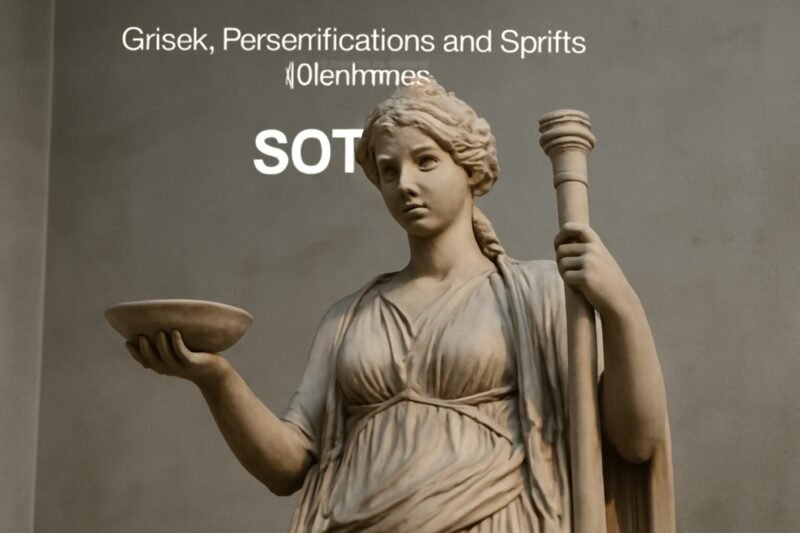Soteria: The Greek Goddess of Safety and Deliverance
In Greek mythology, Soteria (Σωτηρία) was the personification of safety, preservation, and deliverance from harm. Her name literally means "salvation" or "deliverance" in Greek, reflecting her role as a protective deity who safeguarded individuals and communities from danger.
Origins and Family
Soteria was often considered a daughter of Dionysus, the god of wine and ecstasy, and Aphrodite, the goddess of love. In some traditions, she was also associated with Zeus Soter (Zeus the Savior), emphasizing her divine connection to protection and rescue. She was sometimes depicted alongside her male counterpart, Soter, who embodied similar protective qualities.
Role and Significance
Soteria was worshiped as a guardian against misfortune, particularly in times of crisis. Ancient Greeks invoked her name for safety during travel, war, and natural disasters. She was especially revered by sailors, who prayed to her for safe voyages and deliverance from storms. Cities and individuals often made offerings to Soteria in gratitude for surviving perilous situations.
Her influence extended beyond physical safety—she also symbolized spiritual and emotional salvation. In some cults, she was linked to healing and the restoration of well-being, bridging the gap between mortal suffering and divine intervention.
Depictions and Worship
Though not as prominently featured in myths as other Olympian gods, Soteria appeared in art and literature as a benevolent figure, sometimes shown holding a torch (symbolizing hope) or a rudder (representing safe navigation). Festivals called "Soteria" were held in her honor, particularly in cities like Delphi and Aegina, where she was celebrated alongside Apollo or Zeus.
Her legacy endures in modern language—the word "soteriology" (the study of salvation) derives from her name, a testament to her lasting cultural impact.
Alternative Names for Soteria
God Name: Soteira (Greek)
Soteira is the feminine form of Soteria, used in some contexts to refer to the goddess of safety and deliverance from harm, emphasizing her protective aspects.
God Name: Salus (Roman)
Salus is the Roman equivalent of Soteria, representing health, safety, and well-being. She was worshiped as a goddess of preservation and salvation in Roman religion.
God Name: Hygeia (Greek)
Hygeia, though primarily the goddess of health, is sometimes associated with Soteria due to overlapping domains of protection and well-being in Greek mythology.
God Name: Eleos (Greek)
Eleos, the personification of mercy and compassion, shares thematic similarities with Soteria, particularly in contexts involving deliverance from suffering or danger.
Tales about Soteria
The Alliance of Soteria and Asclepius
In the age when mortals were plagued by a relentless pestilence, Asclepius, the god of medicine, tirelessly worked to heal the afflicted. Yet, the disease spread faster than his remedies could cure, and despair began to overshadow hope. Sensing the growing desperation, Soteria, the spirit of safety and deliverance, descended from the heavens to offer her aid.
Together, they devised a plan: Asclepius would focus on creating potent cures, while Soteria would instill a sense of resilience and protection among the people. She whispered words of courage to the fearful, shielded the vulnerable with her aura of safety, and guided Asclepius to those most in need. Their collaboration turned the tide; where there was once hopelessness, now stood fortified spirits and recovering bodies. This partnership became legendary, illustrating that true salvation lies not only in healing the body but also in safeguarding the soul.
Soteria's Pact with Zeus
During a tumultuous period when the giants threatened to overthrow Olympus, Zeus called upon all divine forces to unite against the chaos. Among them was Soteria, whose power to ensure safety and deliverance was crucial. Zeus, in his wisdom, knew that victory required not just strength, but the preservation of order and the protection of the innocent.
Soteria wove a protective barrier around the mortal realms, shielding them from the collateral damage of the divine conflict. She also empowered the Olympians with an unshakable sense of security, allowing them to fight with focused determination. In the climactic battle, her influence ensured that no unnecessary harm befell allies or bystanders. Grateful for her pivotal role, Zeus honored Soteria by decreeing that she would always be invoked in times of peril, a testament to her indispensable role in maintaining cosmic balance.
Frequently Asked Questions
Who is Soteria in Greek mythology?
Soteria is the Greek goddess or spirit (daimon) of safety, deliverance, and preservation from harm. She represents the concept of salvation and protection, often invoked for safety in times of danger.
What are daimones in Greek mythology?
Daimones (or daemons) in Greek mythology are lesser deities, spirits, or personifications of abstract concepts like emotions, actions, or natural phenomena. They are not gods but serve as intermediaries between gods and humans.
Why is Soteria important in Greek mythology?
Soteria symbolizes the human desire for safety and rescue, reflecting ancient Greek values of community protection and divine intervention. Her presence highlights the importance of deliverance and hope in difficult times.
How does the concept of Soteria apply today?
The idea of Soteria resonates today as people still seek safety and deliverance from crises. Modern terms like 'salvation' or 'protection' stem from similar ancient beliefs in divine or communal safeguarding.
Are daimones good or evil in Greek mythology?
Daimones are neither inherently good nor evilu2014they embody neutral forces or concepts. Some bring blessings (like Soteria), while others may represent less favorable ideas, depending on their role in myths.













